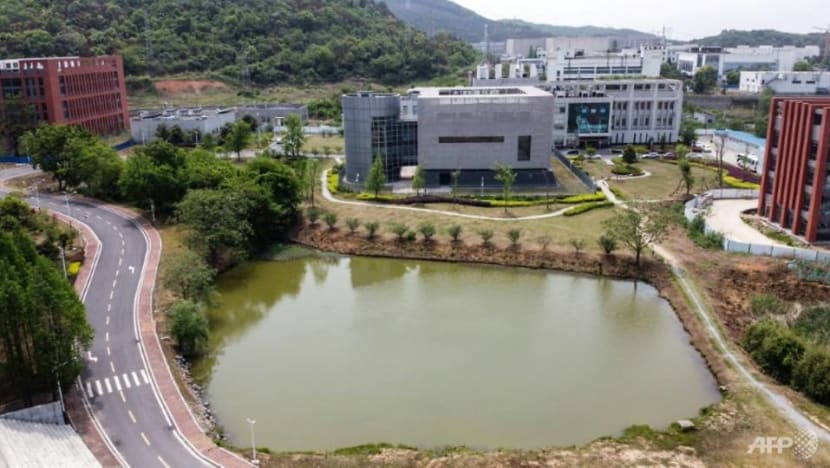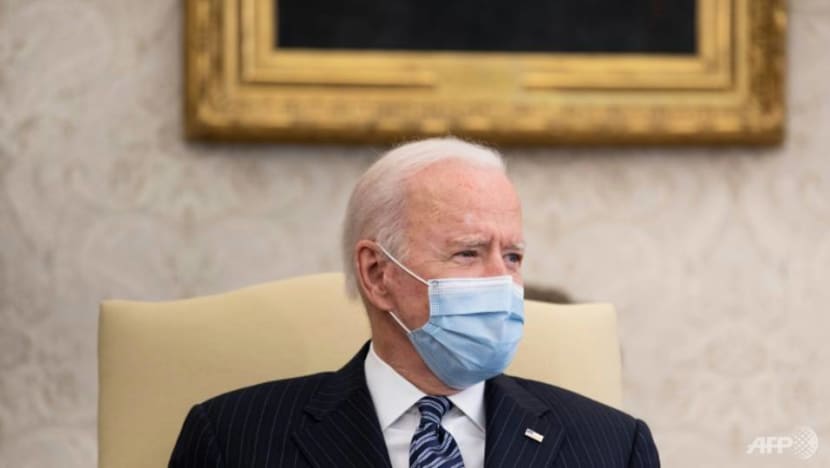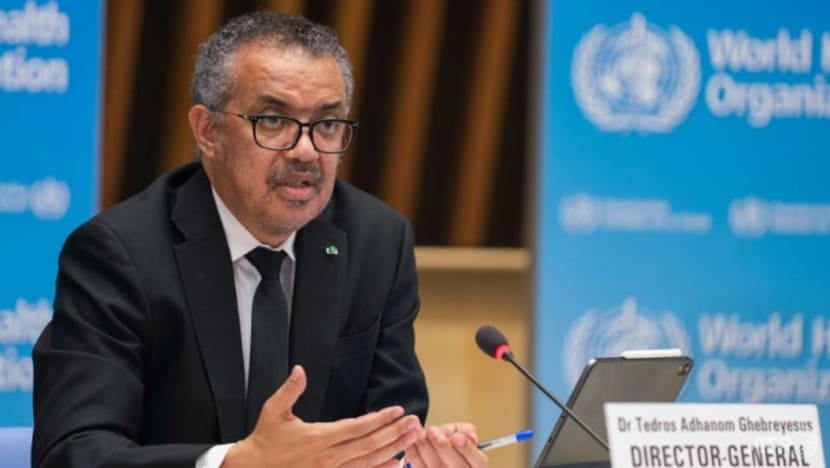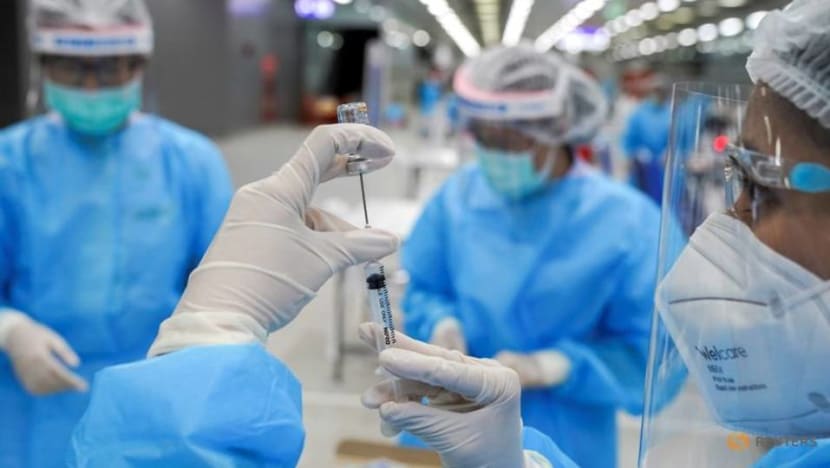commentary Commentary
Commentary: What’s really behind fresh calls for investigations into COVID-19 origins
Investigations into the origins of COVID-19 are not just about scientific interest, but part of the competition for influence between the US and China, says Christian Le Miere.

The P4 laboratory (C) at the Wuhan Institute of Virology in Wuhan, China one of just among a handful of labs worldwide cleared to handle dangerous viruses that pose a high risk of person-to-person transmission AFP/Hector RETAMAL
LONDON: After 18 months, the world still does not know the answer to one of the most important questions in this pandemic: How did COVID-19 enter the human population?
For much of last year, the dominant theory has been one of zoonotic spill-over, with the virus initially transmitting from an animal, most likely a bat, to humans, possibly through a medium such as the Huanan wet market in Wuhan.
But US President Joe Biden recently raised suspicions that another explanation may be feasible.
READ: Chinese embassy in US says politicising COVID-19 origins hampers investigations
READ: Commentary: Divided Americans can agree on one thing – antagonising China
RENEWED INVESTIGATIONS
In a statement on Wednesday (26 May), Biden ordered a 90-day period for the intelligence community to “redouble their efforts” in order to reach a “definitive conclusion”.
More specifically, he ordered them to determine if the virus had “emerged from human contact with an infected animal or from a laboratory accident”.
In doing so, Biden has reignited a contentious issue between the US and China, reasserting pressure on Beijing to deliver an effective investigation and assume responsibility for the origins of the virus.

Biden also noted that the intelligence community only held low to moderate confidence in their assessments on the origin of COVID-19, and the community disagreed on whether zoonotic spill-over was more likely.
His statement has added fuel to the fire of the “lab leak” theory.
This idea suggests it was not a market or other civilian interaction between humans and animals that first allowed COVID-19 to infect humans.
Rather, it was the Wuhan Institute of Virology, home to China’s only biosafety level 4 laboratory that handles the most dangerous known pathogens, that was to blame, with an accidental escape of one of the coronaviruses studied there.
READ: Commentary: Variants versus vaccines is becoming the new COVID-19 race
READ: Commentary: New names for coronavirus variants will end stigma for countries
The institute is a few kilometres away from the Huanan wet market where the first cluster of infections emerged.
US intelligence agencies have also reportedly discovered that three researchers at the institute fell seriously ill with COVID-like symptoms in November 2019, weeks before the first identified case of the virus.
More outlandish theories have even claimed the virus was genetically engineered and intentionally leaked from the lab by Beijing to weaken Western economies.

For much of 2020, proponents of this theory were given short shrift, with opponents suggesting it bordered on conspiracy.
But the theory was given further impetus on Sunday, when British intelligence agencies briefed UK newspapers and claimed the lab leak theory was “plausible” and “feasible”.
The abrupt turnaround in discussion of the lab leak theory from political and intelligence sources is a distinct development in a process that until now had been driven by the World Health Organization’s investigation involving 17 Chinese and 17 international scientists.
That investigation released its first report at the end of March, suggesting that a zoonotic spillover was “likely to very likely” the cause of the first human transmission and that a lab leak theory was “extremely unlikely.”
Healthcare experts are also re-examining the medical basis of this theory. US chief medical adviser Dr Anthony Fauci said on Thursday (Jun 3) he hoped to see the medical records of the three Chinese researchers who reported sick in 2019.
Are COVID-19 vaccines still effective against new variants? And could these increase the risk of reinfection? Experts explain why COVID-19 could become a “chronic problem" on CNA's Heart of the Matter podcast.
POINTING FINGERS
Why are the US and its allies raising the lab leak theory so prominently now? The current interest is framed by Western states as an attempt to finally get to the bottom of the mystery behind the origin of COVID-19.
There are valid scientific and historical reasons to want to do so: Understanding how the virus transmitted to humans may help in understanding the virus’ evolution that allowed human infection and preventing future outbreaks.
But the investigation is also contentious because the story about the origins of this world-shaking virus is highly politicised.
From the early months of the viral outbreak, China has attempted to confuse and obfuscate the issue.
READ: Commentary: Why are Chinese officials acting like Internet trolls and entertaining online fights with the US?
Chinese state-run media and online wolf warriors began circulating disinformation in early 2020 that the virus could have been brought to China by US servicemen and women who attended the World Military Games in Wuhan in October 2019.
Chinese media similarly suggested in November 2020 that the discovery of COVID-19 on the surface of frozen food imports could suggest China was not the source of the virus.
After Biden’s latest intervention, Beijing pushed back hard again, with the embassy in the US suggesting there should be an investigation into “some secret bases and biological labs all over the world”.
Chinese foreign ministry spokesman Zhao Lijian hinted at “secrets … hidden in the suspicion-shrouded Fort Detrick” in the US and claimed Biden’s statement was just an attempt to “use the pandemic for stigmatisation and political manipulation”.
BLAME GAME
This all seems so very petty, but there are significant ramifications behind this blame game.
For Beijing, it wants to move the conversation on from the origins of the virus, in order to cast itself not as the cause of this global pandemic, but in some ways as its saviour given its export of personal protective equipment (PPE) and vaccines to developing countries worldwide.

For the US, it is an easy lever to pull to increase pressure on China, point out the flaws in Beijing’s early response and continued obscurantism over aspects of the virus.
By reminding the world China is both the source of the virus, and the reason that we still don’t know how the virus entered humans, Washington is able to undermine much of Beijing’s soft power diplomacy in recent months.
Biden is also able to play to a domestic audience that harbours significant concerns over China and large sections of whom believe the lab leak theory to be more viable.
READ: Commentary: Some soul-searching needed in China’s fresh push to make friends and influence people
In this sense, the renewed calls from the US and its allies for a more profound investigation are part of the wider competition for influence between China and the West.
Beijing wants to prove the superiority of its system in effectively handling the virus initially and its largesse to the rest of the world.
Washington, meanwhile, is using this opportunity to shine a spotlight on the tight control of information in China and reinforce a lack of trust in the rhetoric that emanate from the same political system.
Given the high stakes and the likelihood that Beijing will continue to obfuscate over this issue, we may never fully know the exact origins of COVID-19.
But for Washington and Beijing that’s not the point: It’s the blame itself, not the accountability, that is now most important.
Christian Le Miere is a foreign policy adviser and the founder and managing director of Arcipel, a strategic advisory firm based in London.














